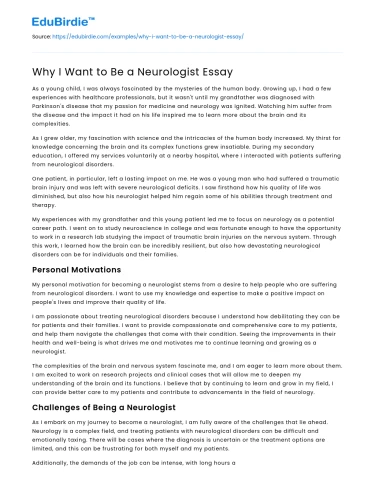As a young child, I was always fascinated by the mysteries of the human body. Growing up, I had a few experiences with healthcare professionals, but it wasn't until my grandfather was diagnosed with Parkinson's disease that my passion for medicine and neurology was ignited. Watching him suffer from the disease and the impact it had on his life inspired me to learn more about the brain and its complexities.
As I grew older, my fascination with science and the intricacies of the human body increased. My thirst for knowledge concerning the brain and its complex functions grew insatiable. During my secondary education, I offered my services voluntarily at a nearby hospital, where I interacted with patients suffering from neurological disorders.
Save your time!
We can take care of your essay
- Proper editing and formatting
- Free revision, title page, and bibliography
- Flexible prices and money-back guarantee
One patient, in particular, left a lasting impact on me. He was a young man who had suffered a traumatic brain injury and was left with severe neurological deficits. I saw firsthand how his quality of life was diminished, but also how his neurologist helped him regain some of his abilities through treatment and therapy.
My experiences with my grandfather and this young patient led me to focus on neurology as a potential career path. I went on to study neuroscience in college and was fortunate enough to have the opportunity to work in a research lab studying the impact of traumatic brain injuries on the nervous system. Through this work, I learned how the brain can be incredibly resilient, but also how devastating neurological disorders can be for individuals and their families.
Personal Motivations
My personal motivation for becoming a neurologist stems from a desire to help people who are suffering from neurological disorders. I want to use my knowledge and expertise to make a positive impact on people's lives and improve their quality of life.
I am passionate about treating neurological disorders because I understand how debilitating they can be for patients and their families. I want to provide compassionate and comprehensive care to my patients, and help them navigate the challenges that come with their condition. Seeing the improvements in their health and well-being is what drives me and motivates me to continue learning and growing as a neurologist.
The complexities of the brain and nervous system fascinate me, and I am eager to learn more about them. I am excited to work on research projects and clinical cases that will allow me to deepen my understanding of the brain and its functions. I believe that by continuing to learn and grow in my field, I can provide better care to my patients and contribute to advancements in the field of neurology.
Challenges of Being a Neurologist
As I embark on my journey to become a neurologist, I am fully aware of the challenges that lie ahead. Neurology is a complex field, and treating patients with neurological disorders can be difficult and emotionally taxing. There will be cases where the diagnosis is uncertain or the treatment options are limited, and this can be frustrating for both myself and my patients.
Additionally, the demands of the job can be intense, with long hours and a constant need to stay up-to-date with the latest research and advancements in the field. However, I am prepared to face these challenges head-on, and I am committed to providing the best possible care to my patients. I know that being a neurologist will require hard work, dedication, and a constant desire to learn and improve. But the reward of making a positive impact on people's lives and contributing to the field of neurology makes it all worth it. I am ready to overcome the challenges of being a neurologist and make a meaningful difference in the lives of my patients.
Conclusion
I am excited about the opportunities that a career in neurology presents, and I am eager to make a meaningful contribution to the field. I believe that by working together with other practitioners and researchers, we can improve the lives of those affected by neurological disorders.
In the future, I hope to make significant contributions to the field of neurology, whether through clinical practice or research. I am optimistic about the future of neurology and the advancements that will be made in the treatment and understanding of neurological disorders. As a neurologist, I am committed to being a part of this progress and making a positive impact on the lives of my patients.






 Stuck on your essay?
Stuck on your essay?

